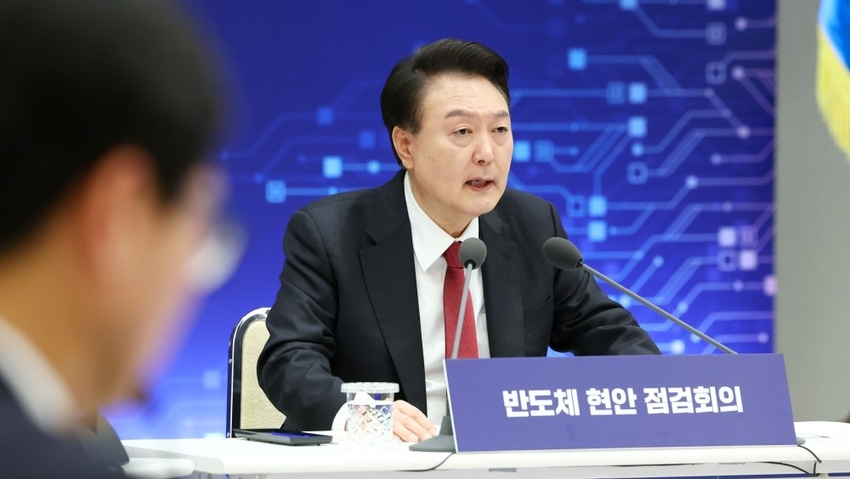South Korea to invest $7B in AI chip manufacturing
South Korea is under mounting pressure to keep pace with the AI boom as the US, China and Japan have come out with policies to bolster their own semiconductor supply chains.

With the goal of becoming one of the top three countries in AI technology, the South Korean government announced that it will invest 9.4 trillion Korean won (US$6.94 billion) in AI in the next three years as the country seeks to retain its leading position in the global semiconductor market.
"Our country already has global competitiveness not only in hardware, such as chips and digital devices, but also in the digital sector, including in AI models and their use," South Korea President Yoon Suk Yeol said in a meeting on Tuesday composed of senior executives from Samsung Electronics, SK hynix, Naver and Sapeon Korea, as well as government ministers from the finance, industry, science, environment and land departments.
"There aren't many countries with both the capability to manufacture hardware and develop and use software," Yoon added. "I will push an AI chip initiative so that our country can enter the G3 in AI technology and go beyond memory chips to conquer the future AI chip market."
As part of the announcement, the government said it will also set up a KRW1.4 trillion ($1 trillion) fund to help domestic AI chipmakers grow.
Keeping up with competition
"Current competition in semiconductors is an industrial war and an all-out war between nations," Yoon said during the meeting.
South Korea is under mounting pressure to keep pace with the AI boom as the US, China and Japan have come out with policies to bolster their own semiconductor supply chains.
On Monday, the US government awarded the US division of Taiwan Semiconductor Manufacturing Co. (TSMC) with a $6.6 billion subsidy for advanced semiconductor production in Phoenix, Arizona, and up to $5 billion in low-cost government loans.
The subsidy comes from the $54-billion Chips and Science Act funding, which seeks to bolster domestic chip manufacturing in the US.
TSMC has agreed to expand its planned investment in the US to $65 billion and to add a third Arizona fab by 2030. The investment is the largest foreign direct investment in a completely new project in US history, according to the US Department of Commerce.
At full capacity, TSMC Arizona's three fabs would manufacture tens of millions of leading-edge chips to power products like 5G/6G smartphones, autonomous vehicles and AI data center servers.
TSMC expects to begin high-volume production in its first US fab during the first half of 2025. The Taiwanese company will also produce what it claims to be the world's most advanced 2 nanometer technology at its second Arizona fab expected to begin production in 2028.
Reviving Japan's semiconductor industry
Meanwhile, Japan early this month approved up to 590 billion Japanese yen ($3.9 billion) in subsidies to chip venture Rapidus in a bid to revive the country's semiconductor industry, as the US keeps adding restrictions on the types of semiconductors that American companies are able to sell to China.
The additional funding – on top of about JPY330 billion ($2.17 billion) in subsidies already pledged by the government – will help the 19-month-old startup buy chipmaking equipment and develop advanced back-end chipmaking processes.
Rapidus aims to mass produce cutting-edge chips on the northern island of Hokkaido in partnership with IBM and Belgium-based research organization Imec. It hopes to compete with chips leaders TSMC and Samsung Electronics.
Using IBM technology, Rapidus hopes to start pilot production of two-nanometer chips in April 2025, with mass production set to begin in 2027.
China, on the other hand, has been encouraging its domestic chip industry for years to reduce its reliance on Western technology, particularly now amid US export restrictions on most advanced chips.
In September, the country was reportedly seeking to raise about $40 billion through a new state-backed investment fund to boost its chip manufacturing industry, as it races to achieve self-sufficiency.
Putting South Korea on the AI chip map
Semiconductors are among South Korea's major exports, posting revenues of $11.7 billion in March – the most in 21 months.
President Yoon has set a target for the country to get more than 10% of the global market for system semiconductors by 2030.
With the new $6.9 billion investment, South Korea plans to significantly expand research and development in AI chips such as artificial neural processing units (NPUs) and next-generation high-bandwidth memory chips.
The government will also promote the development of next-generation artificial general intelligence (AGI) and safety technologies that go beyond existing models.
"Just as we have dominated the world with memory chips for the past 30 years, we will write a new semiconductor myth with AI chips in the next 30 years," Yoon said.
Meanwhile, he reaffirmed plans to begin construction of a KRW622 trillion ($458.24 billion) chip industrial complex in Yongin, 42 kilometers southeast of Seoul, in 2026.
"The government will also supply power and industrial water needed for the construction of this chip mega cluster in southern Gyeonggi," Yoon said.
Read more about:
AsiaAbout the Author(s)
You May Also Like












